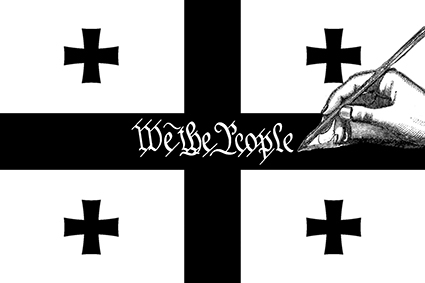‘We the People’
We, the People of Georgia, have been writing the post-communist-era constitution throughout the last three decades, and we are still working on it. It took the American Founding Fathers much less time- and the text of the main law of the land they created has endured centuries, and is still working with the same success it enjoyed at the moment of its ratification almost a quarter of a millennium ago.
What’s wrong with us, folks? Why can’t we write our constitution so well that, once and for all, it is rendered safe forever from the pain of writing and rewriting it over and over again? Nothing needs to be invented: all is written and done in the world; every political philosophy is at hand; most of the tricks of ruling a country are clear. Only reading the already created literature is left, and if necessary, copying it accordingly.
Why is it so difficult? When are we going to be done with the text of Georgia’s main political document? Perhaps, it is to remain an interminable drudgery which will always leave questions to answer, doubts to fight, and uncertainties to overcome. The prolonged process of writing the constitution is our lot, our destiny, our luck and the cross we will have to carry perennially. And here is why: I suspect that the writers of the constitution in Georgia have a proclivity to accommodate its text to the times and circumstances they are living in, not looking into the future with wide-open eyes; tailoring the text to the persons who are at the helm of the nation of the time. They do not want to create a document which will cover the centuries to come rather than just months and years; they are not sufficiently familiar with the constitutional experience of other nations; they are not asking enough questions about the content of the incipient document and its effect on our life in the long run; they are not thinking in global terms; they lack a clear vision of Georgia’s niche in global life; and finally, they do not have in front of them Georgia’s Mission Statement before Mankind, which would conceptualize the justification of our existence as a state and a nation.
As I said, these are only my personal doubts, which I cannot corroborate in any reasonable way except by virtue of the fact that we are still in the painstaking process of writing the blueprint of our nation’s social and political existence. There is one minor detail, though, that might help me to make my statement sound more solid than it actually reads: there is a hot discussion going on concerning writing into the preamble of the constitution the statement about Georgia’s Western geopolitical orientation. How rational could this be? What if the political situation changes for some reason, which the Georgian people would accept with genuine pleasure and calculated reason – just as we have done before? Shall we embark once again on writing a new constitution?
Let me bring the example of the American Constitution, which has gone through many waters and fires in the duration of a couple of centuries, and is still functional. The first part of the United States Constitution, called the Document, contains a Preamble, which is a brief statement expressing the intentions of the authors. The Preamble states: We, the people of the United States, in order to form a more perfect union, establish justice, insure domestic tranquility, provide for the common defense, promote the general welfare, and secure the blessings of liberty to ourselves and our posterity, do ordain and establish this Constitution for the United States of America. You see, how laconically this generic but amazingly comprehensive text is presented?! You couldn’t edit it even if you wanted to because the text is uncannily optimal, and is and will stay so for any imaginable period of time in the nation’s history. Again, it doesn’t say much but it says all.
Let us hypothetically use this text as the preamble to Georgia’s Constitution. Would you change anything? Is there any word in it which would not be politically justified in the life of the Georgian people? So why can’t we invent something like this without any precarious allusions to specific political concepts and situations? That’s what I was talking about when I said: what’s wrong with us, folks?
Nugzar B. Ruhadze
Illustration by Brian Patrick Grady












